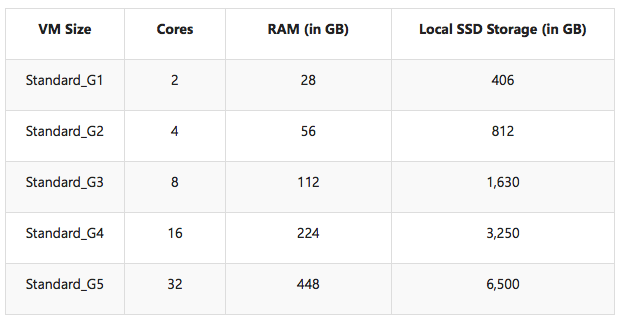Microsoft Fattens Up Azure Compute To Compete

Microsoft's entry this week into the converged cloud infrastructure market was accompanied by the roll out of a new series of virtual machines for the Azure cloud.
In laying out the latest refinement of its cloud strategy, the company claimed its Xeon-powered G-Series offers "the largest VM in the public cloud" capable of handling enterprise workloads.
The G-Series instances at Azure were announced in tandem with an Azure Premium Storage upgrade, a solid-state drive-based storage feature targeting I/O intensive workloads, Jason Zander, corporate vice president of the Microsoft Azure Team, said in a blog post.
The G-Series VMs draw their computational performance from the latest Intel Xeon processor, the "Haswell" E5-2600 v3 family. Microsoft claimed the G-series provides more memory (multiples of 28 GB depending on the VM size) and local SSD (multiples of 406 GB) than other current VM configurations operating in the public cloud (see chart).
The largest version of the G-Series with 32 cores includes 448 GB of RAM and 6.5 TB of local SSD storage.
Combined with the upgraded storage option, Microsoft said the new VMs would allow Azure to offer a "lift-and-shift" capability for moving enterprise applications, backed by its own SQL Server relational database as well as the Oracle 11g and 12c and MySQL alternatives, to the cloud.
The G-series VM introduction is one piece of an overall effort to differentiate Microsoft Azure from cloud services offered by rivals like Amazon Web Services (AWS), Google, IBM SoftLayer, and Rackspace Hosting. Scott Guthrie, executive vice president of Microsoft's Cloud and Enterprise Group listed Azure's hyper-scaling, enterprise grade and hybrid capabilities as the key differences between Microsoft's cloud offering and its rivals.
Guthrie claimed the new Microsoft VMs deliver twice the memory of the largest AWS EC2 virtual machines and four times that of Google's Compute Engine cloud service.
The company tied the VM announcement to its new premium storage offering, which it said could be used to provision a persistent disk. The disk could be configured depending on storage size and performance requirements.
Microsoft's Zander added that several persistent disks could be attached to a virtual machine to deliver up to 32 TB of storage per VM with more than 50,000 IOPS per VM.
Along with storage and VM performance upgrades, Microsoft executives are also seeking to differentiate its cloud offering by stressing Azure's flexibility. For example, Microsoft CEO Satya Nadella said its infrastructure enables the use of both Windows Server and Linux on the Azure cloud.
"We support Linux and Windows Server, " Nadella stressed. "Microsoft loves Linux. Twenty percent of Azure is already Linux," he added.
Microsoft said it expects to make the G-series VM generally available later this year. Pricing was not announced.
In the meantime, the software giant is offering a free trial to run up to 14 Windows or Linux VMs for a month. The VMs also can be used to run an SQL server or deploy an application container VM, Microsoft said.
Related
George Leopold has written about science and technology for more than 30 years, focusing on electronics and aerospace technology. He previously served as executive editor of Electronic Engineering Times. Leopold is the author of "Calculated Risk: The Supersonic Life and Times of Gus Grissom" (Purdue University Press, 2016).











